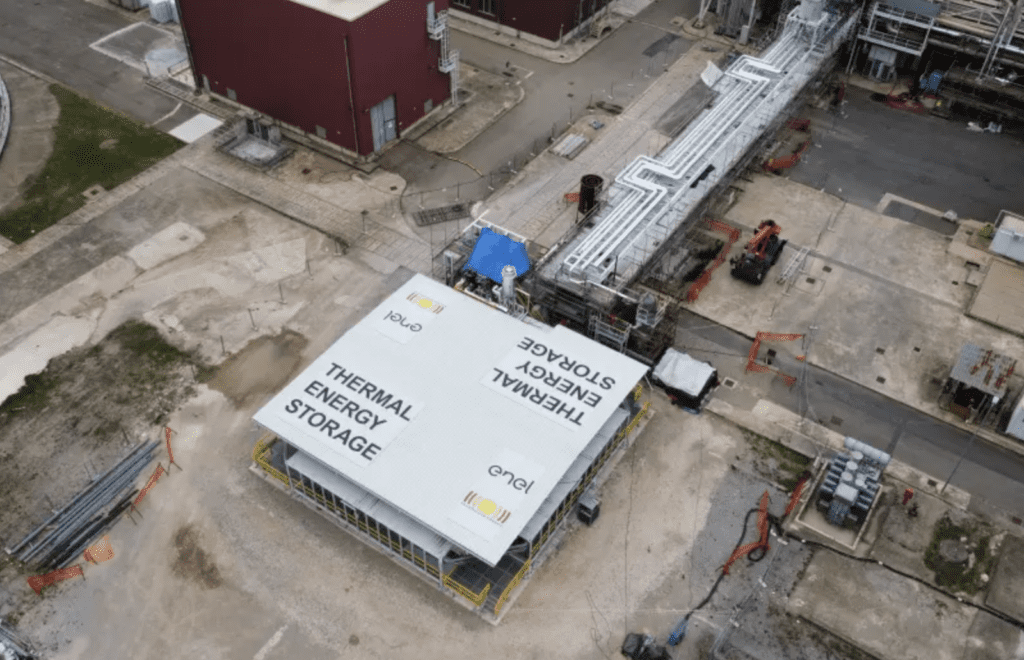Enel Gas-Fired Plant Will Use Rock-Based Energy Storage System
Two groups involved in innovation for power generation, including Italy’s largest utility, have teamed to build a rock-based energy storage system to capture excess power at a natural gas-fired power plant in Tuscany.
Italy’s Enel, along with Israel’s Brenmiller Energy, have said the project aligns with their efforts to test new technologies to increase flexibility in the use of renewable energy. The groups inaugurated the new project on Nov. 4 at the 390-MW Santa Barbara power plant near the Tuscan town of Arezzo. The Santa Barbara plant was originally commissioned in 2007.
The companies in a joint statement Friday said the thermal energy storage (TES) project enables excess energy from the power plant to be stored in the form of heat, making the facility more flexible and supporting the integration of renewable energy resources to the grid.
Decarbonization Solution
“This solution makes renewables more reliable, flexible and resilient and can be used to decarbonize sectors that need heat at high temperatures,” said Ernesto Ciorra, Enel’s Head of Innovation. Ciorra said the system was based on the use of “common stones” and not rare materials, making it sustainable.
The TES technology utilizes a two-stage charge and discharge process to provide thermal energy. Enel said that during the charging phase, steam produced by the power plant passes through pipes to heat crushed rocks adjacent to the pipes. The accumulated heat is released during the discharge process, heating pressurized water and generating steam for electricity.

“We’ve dedicated the past 10-plus years to developing a resilient and scalable solution that meets the market’s requirement for on-demand access to renewable energy, even when the sun isn’t shining or the wind isn’t blowing that hard,” Doron Brenmiller, chief business officer for Brenmiller Energy, told POWER. “We’re extremely proud to showcase this novel application for thermal energy storage with our partners at Enel. Our thermal energy storage system has a number of applications beyond utility-scale operations, and can help decarbonize commercial and industrial operations that require heat at very high temperatures. With the inauguration of this project, Brenmiller Energy has demonstrated to the world for the first time the viability of utility-scale thermal energy storage systems and will provide flexible and reliable power for the citizens of Tuscany, in addition to commercial applications elsewhere. We look forward to deepening our relationship with Enel in Santa Barbara and beyond.”
The groups said the system can store up to 24 MWh of clean heat at about 550C (1,022F) for five hours, which provides resiliency to the power plant. The project was partly financed by the Israeli Innovation Authority, which supported Brenmiller with 1 million euros ($1.002 million) in financing.
Field Test for Technology
The energy companies in joint news release said, “The integration of the TES system with the existing power plant enables Enel and Brenmiller to test the technology in the field, in challenging operating conditions and on a large scale. The system offers reduced power plant start-up times and greater speed in load variations, which are necessary performance requirements to enable the efficient use of renewable energy. The system can be used to store excess energy produced from renewable sources in the form of heat to offer decarbonization services to industrial customers and to integrate long-term storage solutions with renewable plants.”
Brenmiller Energy supplied the storage system for the project after developing the technology in Israel. Enel integrated the system with its Santa Barbara power plant and helped to validate its performance in a real environment.
“Flexibility and adequacy are two fundamental components of an efficient and reliable electricity system, which can be supplied more and more efficiently by storage,” said Salvatore Bernabei, Head of Enel Green Power and Thermal Generation at Enel. “This trial allows us to validate a family of innovative and sustainable technologies in the segment of long-term storage, which will allow for an ever-greater integration of renewables into the grid.”
Utility-Scale Thermal Energy Storage
“Our TES system at Enel’s Santa Barbara power plant in Tuscany is the first-ever system of its kind to provide utility-scale thermal energy storage and offers commercial and industrial users a viable path towards decarbonization,” said Avi Brenmiller, chairman and CEO of Brenmiller Energy. “The TES also makes it possible to add additional renewables to the grid with greater reliability. We believe the success of this moment reflects the types of innovative collaborations needed to transition the global economy away from its heavy, albeit lessening, dependence on fossil fuels, and towards a 100% clean, flexible, and affordable energy grid.”
“Today we are celebrating a successful Italian-Israeli cooperation experience thanks to which Italy will benefit from an innovative made-in-Israel solution for energy storage,” said Alon Bar, the Ambassador-Designate of Israel in Italy. “A technology that stands out in the international search for clean energy solutions to face the current global energy crisis. The Brenmiller Energy-Enel partnership takes the form of a continuation of the commitment made by the Israeli Embassy in promoting the collaboration protocol between the Israel Innovation Authority and Enel signed in 2015. This makes us particularly happy and enthusiastic in continuing to help these companies to thrive.”
Ciorra said the rocks used in system make it scalable and sustainable. “It does not involve any use of rare materials and can be made using stones available in every part of the planet, so it is scalable in a sustainable way everywhere,” he said. “We thank the colleagues of the Tel Aviv hub for having found it and our Italian colleagues for having implemented it, thanks also to the financial support deriving from the collaboration between the Italian and Israeli governments.”
—Darrell Proctor is a senior associate editor for POWER (@POWERmagazine).